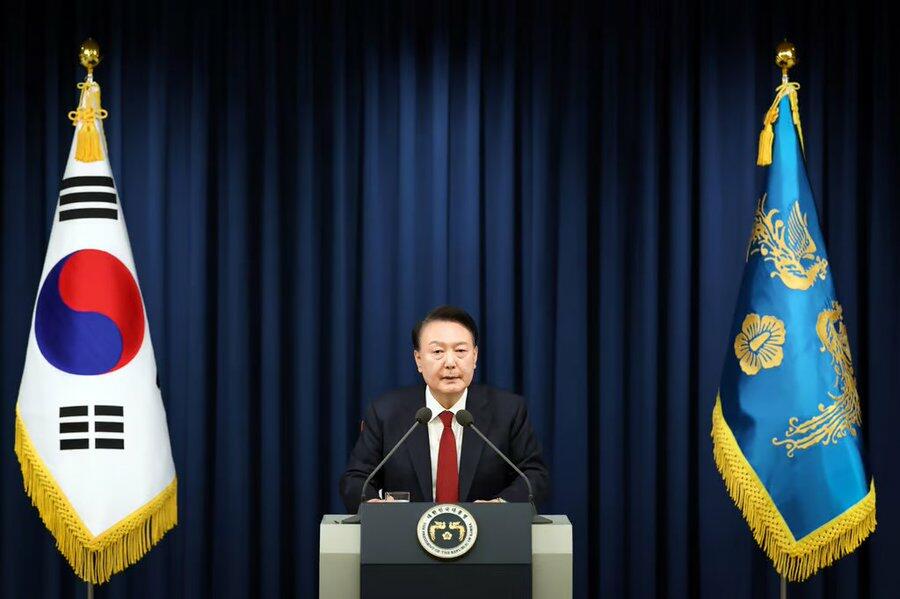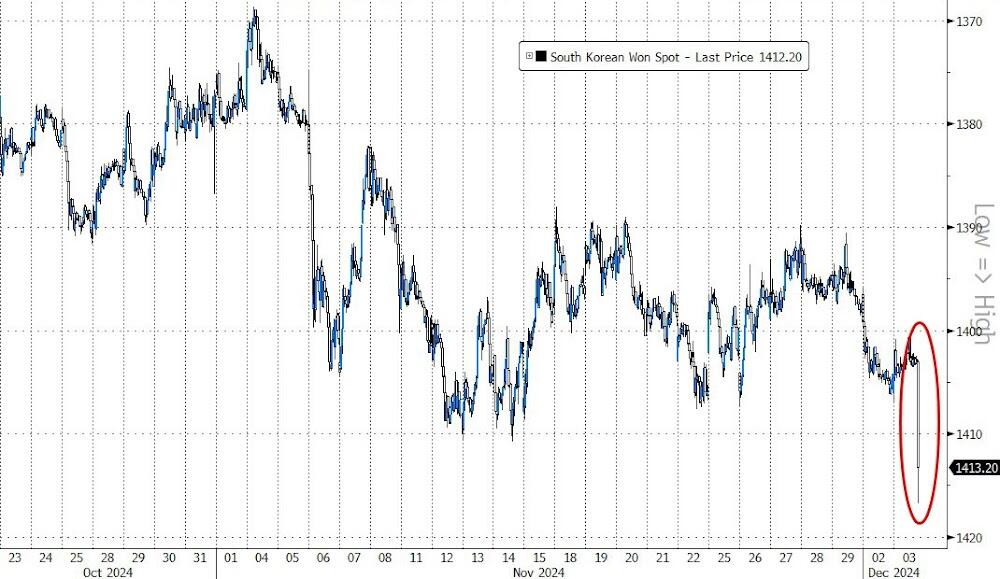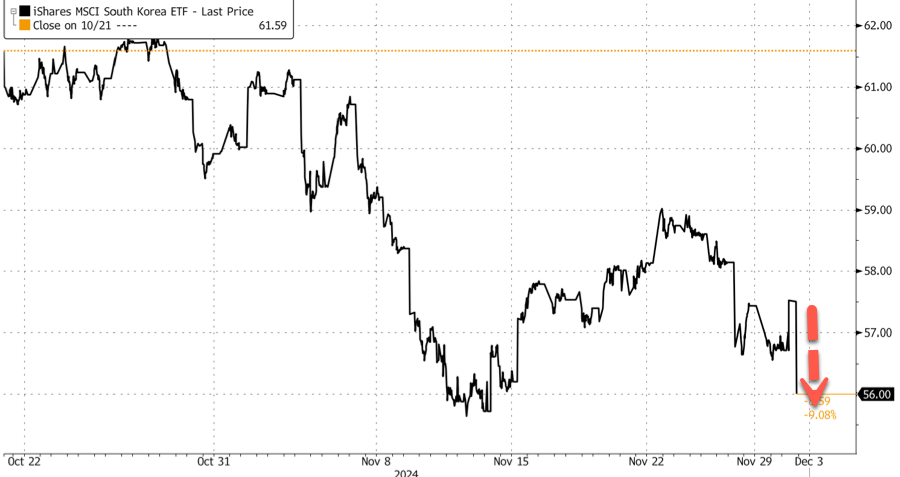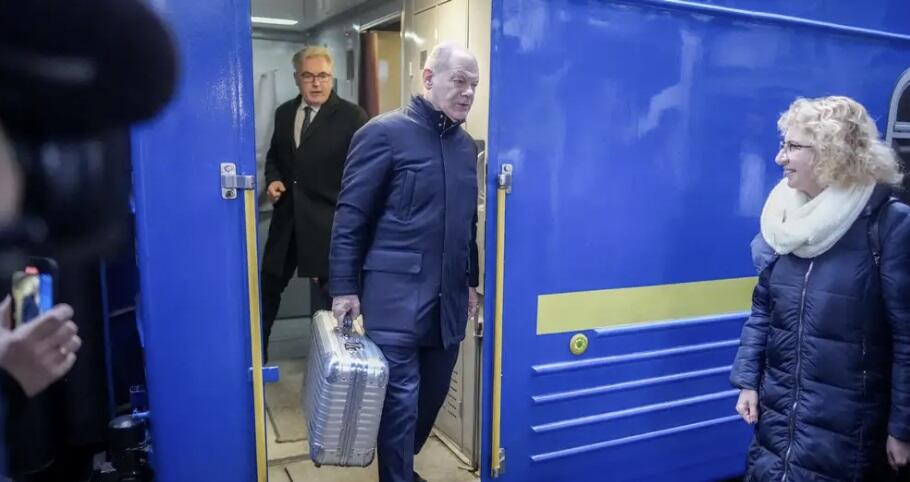Watch Live:
AP News:
Reuters:
* * *
Update (1115ET):
President Yoon Suk Yeol announced on local television that he would lift martial law hours after being rejected by South Korea's National Assembly. This marks the largest flare-up in political turmoil in South Korea since full-scale martial law was declared in the spring of 1980.
For Premium Subs:
In prediction markets, the Polymarket contract "Yoon out as president of South Korea in 2024?" peaked as high as 74% by late afternoon.
* * *
Update (1115ET):
After the South Korean parliament rejected the short-lived martial law declared by President Yoon Suk Yeol, protests erupted in the streets of Seoul outside government buildings.
* * *
Update (1115ET):
Well, that was exciting—some midnight political infighting in South Korea. As we noted earlier: "There is no actual emergency."
Now, the shortest emergency martial law in history appears to be over:
- S. KOREA LAWMAKERS TO VOTE ON MARTIAL LAW LIFT
Followed by:
S. KOREA PARLIAMENT PASSES REQUEST OF MARTIAL LAW LIFT
SOUTH KOREAN PARLIAMENT VOTES TO BLOCK PRESIDENT'S MARTIAL LAW DECLARATION
* * *
Moments ago, South Korean President Yoon Suk Yeol declared emergency martial law, accusing the opposition party of engaging in anti-state activities. This is not a headline you see every day.
Here are the headlines via AFP News:
SOUTH KOREA'S YOON SAYS GOVERNMENT ADMINISTRATION HAS BEEN PARALYZED BECAUSE OF OPPOSITION PARTY CONDUCTS
SOUTH KOREA'S YOON SAYS THROUGH MARTIAL LAW HE WILL REBUILD FREE AND DEMOCRATIC COUNTRY
AP News sheds more color on the situation:
President Yoon Suk Yeol made the announcement during a televised briefing, vowing to "eradicate pro-North Korean forces and protect the constitutional democratic order." It wasn't immediately clear how the steps would affect the country's governance and democracy.
Yoon — whose approval rating has dipped in recent months — has struggled to push his agenda against an opposition-controlled parliament since taking office in 2022.
Yoon's conservative People Power Party had been locked in an impasse with the liberal opposition Democratic Party over next year's budget bill. He has also been dismissing calls for independent investigations into scandals involving his wife and top officials, drawing quick, strong rebukes from his political rivals.
All of this is unfolding as President Yoon Suk Yeol's approval rating continues to slide...
More saber rattling from President Yoon Suk Yeol, as per the Philippines news outlet Rappler:
"Yoon said he had no choice but to resort to such a measure in order to safeguard free and constitutional order, saying opposition parties have taken hostage of the parliamentary process to throw the country into a crisis.
"I declare martial law to protect the free Republic of Korea from the threat of North Korean communist forces, to eradicate the despicable pro-North Korean anti-state forces that are plundering the freedom and happiness of our people, and to protect the free constitutional order," Yoon said.
South Korean news agency Yonhap News Agency said, "The [South Korean] defense minister has ordered a meeting of key commanders and called for tightened vigilance...after President Yoon Suk Yeol declared emergency martial law. The minister has also ordered the military to stay on emergency guard"
Police buses have blocked the National Assembly.
Another view.
South Korean soldiers are stationed outside Parliament.
Armored personnel carriers were apparently on the streets.
Ruling People Power Party Chair Han Dong-hoon criticized President Yoon Suk Yeol's emergency martial law, calling the decision "wrong," adding that he plans to stop the president's emergency action "alongside the people."
Our take...
For some context, the Korean newspaper Chosun Daily pointed out, "Martial law has been declared 16 times since the Republic of Korea’s establishment, including 12 instances of emergency martial law."
In a recent Korea Times op-ed, Chun In-bum, a retired ROK Lieutenant General, stated:
Recent comments and accusations suggesting that the Yoon Suk Yeol administration may be creating a situation to declare martial law have reignited interest in the topic within South Korea.
...
Martial law is divided into two types:
emergency martial law, and
security martial law.
Emergency martial law grants the government sweeping powers, such as suspending the warrant system, restricting freedom of the press, curbing publication rights and limiting assembly and association, as well as overriding the authority of civilian courts and government agencies. When martial law is declared, the president must notify the National Assembly immediately. If the National Assembly demands its termination by a majority vote, the president is legally obligated to comply. While the National Assembly retains legislative authority, there are exceptional circumstances under which a military regime can temporarily assume control, particularly in the event of a coup that disrupts the normal constitutional order.
Martial law has a troubled history in South Korea. It was first declared on Oct. 21, 1948, in response to the Yeosu-Suncheon Incident, a rebellion by South Korean soldiers who refused to suppress a left-wing uprising. Since then, it has been used by various regimes as a mechanism to maintain power, often at the expense of civil liberties. One of the most infamous instances occurred in 1979, following the assassination of President Park Chung-hee. Martial law was declared nationwide, leading to the suppression of pro-democracy movements and widespread human rights abuses.
These historical abuses of martial law have left a deep imprint on South Korean society, creating a strong public aversion to any suggestion of its reimplementation. The memories of authoritarian rule, censorship and political persecution are still fresh for many citizens, particularly for those who lived through the turbulent decades of the 1960s to 1980s. The last declaration of martial law, in 1979, marked a period of intense social and political repression and the eventual rise of a democratic movement that culminated in the democratic reforms of the late 1980s.
In markets, South Korea's won dropped 1% to a two-year low of 1419.28 versus the dollar.
Ishares Msci South Korea ETF (EWY) falls 2.5% in premarket trading.
Commenting on EWY trading, Goldman's Chris Lucas told clients that "block sellers were active in South Korea (EWY) – notable headlines regarding South Korea this morning."
Bloomberg's Sebastian Boyd said the turmoil in South Korea "should be limited as crisis is domestic..."
Here's more from Boyd:
None of this need impact US stocks or US risk appetite, except insofar as holders of South Korean assets seek safe havens amid the evident rise in political risk there. It's natural that bonds should gain as Korean traders buy Treasuries, but there's no apparent need for traders elsewhere to do so -- other than front-running that demand.
https://www.zerohedge.com/geopolitical/south-korea-declares-emergency-martial-law




